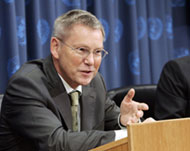Syrians expect UN pressure to grow
Syrian analysts have said they do not expect Russia and China to veto a UN Security Council resolution threatening Damascus with punitive sanctions.

“All that could happen is that the language of the resolution will be toned down. But the pressure on Syria will continue to grow gradually,” said Michel Kilo, a Damascus-based analyst, who is openly critical of the Syrian regime.
The draft resolution, which is co-sponsored by the United States, France and Britain, warns that the Security Council would consider “further measures pursuant to article 41 of the [UN] charter” if Syria fails to cooperate in the investigation of the assassination of former Lebanese premier Rafiq al-Hariri.
The resolution is likely to demand Syria detain anyone UN investigators consider a suspect and allow the investigators to determine the location and conditions under which the individual would be questioned.
“Officials here still think that Russia or China are [willing to] harm their relations with the United States for the sake of Syria, and this is not true,” said Kilo.
Hussein Uwdat, a senior member of al-Atassi political dissident forum, agreed. “Russia and China will not veto the draft resolution and ruin their relations with Washington,” he said.
“The maximum action that they will take is hold talks with the Americans and French to modify the resolution and make it more moderate just like what happened with UN Resolution 1559.”
The resolution had called on all non-Lebanese armed forces to withdraw from the country and reiterated the Security Council’s support and recognition of Lebanon’s sovereignty.
Soft option
Last week, Russia and China, two of the five veto-wielding permanent members of the 15-member Security Council, said they would vote against sanctions.
 |
|
The Security Council is to discuss |
But their opposition appears to be softening.
Bloomberg News quoted Chinese Ambassador Wang Guangya as saying: “I don’t think it will go that far,” when asked whether he would cast a veto.
Russian Ambassador Andrey Denisov said talks were “on the right track” and that his government wasn’t considering a veto.
Last year, the Security Council adopted UN Resolution 1559 after modifying the original draft by dropping a threat to consider “additional measures” if Beirut and Damascus refused to comply.
Amended draft
Resolution 1559 was put to a vote a day before Lebanon’s parliament was scheduled to amend the constitution to allow President Emile Lahoud to stay in power for another three years in response to Syrian wishes. It called for a respect of Lebanon’s sovereignty.
China and Russia, two veto-wielding permanent members of the council, abstained, along with four rotating members – Algeria, Pakistan, Brazil and the Philippines.
Representatives of those countries explained their position by saying the resolution touched on Lebanon’s internal affairs, in contravention to the UN Charter.
Another amendment was made to the second point in the resolution. In the final draft, the Security Council “calls upon all remaining foreign forces to withdraw from Lebanon,” an indirect reference to Syria.
The second point in the final draft also changed a “demand” for foreign troops to leave Lebanon into a “call.”
Syria pulled out its troops last April amid massive local and international pressure two months after the assassination of al-Hariri.
Syrian reaction criticised
An investigation into the 14 February killing of al-Hariri led by veteran German prosecutor Detlev Mehlis found “that many leads point directly towards Syrian security officials as being involved with the assassination”.
Syrian officials dismissed the 53-page report calling it highly politicised.
But Kilo believed the Syrian government’s reaction to the UN report was “backward”.
 |
|
Detlev Mehlis implicated Syrian |
“If the report was really politicised, Mehlis would have accused Hizb Allah in al-Hariri’s assassination, because the main concern for the United States is getting rid of Hizb Allah,” said Kilo about the Lebanese resistance group that spearheaded a military campaign which drove Israeli forces out of southern Lebanon in May 2000.
Kilo said Syria was causing a blunder by using the same tone to address both a domestic and international audience.
“Syrian officials have to understand that addressing the domestic population, which has no access to a free flow of information, is different from addressing the entire world,” he said.
“Dismissing the report as politicised can work domestically, but not at the Security Council. What they should do is to thank Mehlis for his efforts and tell him his work is not complete yet and that they will help making his mission accomplished.”
Politicised report?
 |
|
Many Syrians believe the Mehlis |
Nevertheless, Syrian officials continued to insist Mehlis had been biased in his investigation.
Former MP Samir Taqi said the report was based on testimonies of witnesses and hearsay rather than on tangible evidence.
“Mehlis chose to believe testimonies that President Assad threatened al-Hariri, although the president clearly stated in a television interview that he did not,” said Taqi.
Government-run newspapers in Damascus have been harshly criticising the Mehlis report since its release. A front-page commentary on the Tishreen daily said the report raised questions more than it provided answers “or even semi- answers.”
An editorial in al-Thawra newspaper criticised the report for “taking into serious consideration the testimonies of those who hate Syria and those trying to tarnish its reputation while neglecting Syrian testimonies that aim at presenting facts.”
The editorial called on Mehlis to “correct the mistakes committed in the report during the following stage of his mission to avoid falling in the trap that could serve US and Israeli political plans” in the region.
“We are not the only ones that are targeted,” wrote Fawzi al-Saegh, editor-in-chief of the al-Thawra government mouthpiece.
“But we were chosen to be the prime target, because the fall of Syria would facilitate and simplify measures against other Arabs later.”